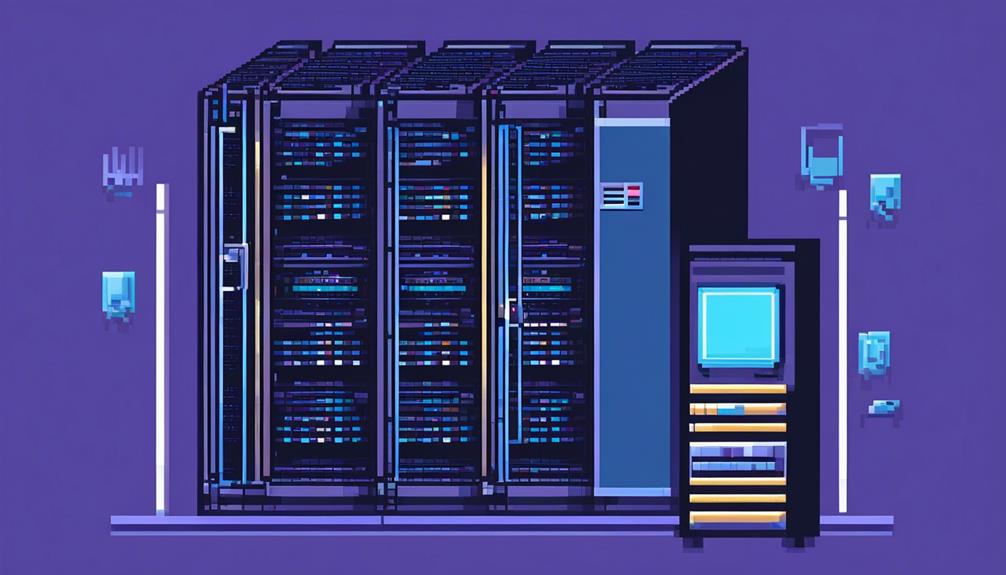Modular data center solutions have revolutionized the way businesses approach their data center infrastructure. With their numerous benefits, including flexibility, speed, and cost savings, modular data centers have become an attractive option for organizations of all sizes.
By allowing for easy scalability and growth, these solutions offer businesses the ability to adapt their data center needs as their operations evolve. Moreover, the efficiency and predictability offered by modular data centers provide a streamlined and reliable deployment process, ensuring faster implementation and reduced construction times.
In this discussion, we will explore the various advantages and applications of modular data centers, delve into the success stories of their implementation, and discover the wide range of products and solutions available in this evolving field.
So, let's dive into the world of modular data center solutions and uncover how they can transform your business's infrastructure.
Key Takeaways
- Modular data centers offer flexibility and scalability for building and growing data centers, accommodating increasing storage and processing requirements.
- Deployment times for modular data centers are significantly reduced compared to traditional builds, resulting in faster implementation.
- Modular data centers provide consistent levels of density, availability, and cost, aligning with the needs of colocation and cloud providers.
- Schneider Electric solutions offer flexibility for expansion or reconfiguration without disruptions, simplified site coordination and scheduling, and the ability to deploy data centers in various locations, including remote or harsh environments.
Benefits of Modular Data Centers
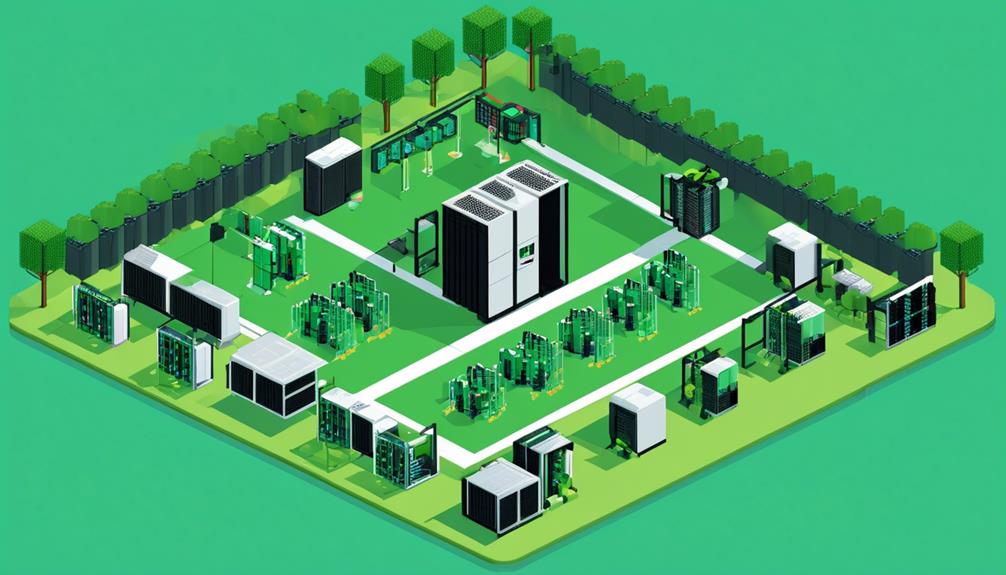
Modular data centers provide numerous benefits, making them a highly efficient and adaptable solution for modern data storage and management needs. These benefits stem from the unique design and construction of modular data center solutions, which offer flexibility, speed, predictability, and reduced deployment times compared to traditional data center infrastructure.
One of the key benefits of modular data centers is their flexibility. With modular solutions, organizations can easily build and grow their data centers as needed. The modular design allows for the addition of new modules to accommodate increasing storage and processing requirements, without the need for extensive construction work or disruptions to ongoing operations. This scalability ensures that data centers can quickly adapt to changing business needs and demands.
Speed is another advantage offered by modular data centers. The modular design simplifies site coordination and scheduling, resulting in faster deployment times. Compared to traditional builds, modular data centers can reduce deployment times by up to 50%. This rapid deployment enables organizations to quickly set up their data centers, reducing time-to-market for new products and services.
Predictability is also a significant benefit of modular data centers. With modular solutions, organizations can expect a consistent level of density, availability, and cost. The standardized design and components used in modular data centers ensure that performance and costs can be accurately predicted and managed. This predictability allows organizations to effectively plan and allocate resources, optimizing their data center operations.
As the demand for data storage and processing continues to grow, modular data centers are becoming increasingly popular among colocation and cloud providers. The benefits of flexibility, speed, and predictability offered by modular solutions align well with the needs of these providers, enabling them to scale their infrastructure efficiently and meet the demands of their customers.
Applications of Modular Data Centers
With the diverse range of applications and industries benefiting from their unique design and capabilities, modular data centers have proven to be an invaluable solution for various high-density computing needs.
One notable application of modular data centers is in animation and visual effects studios. For instance, Animal Logic, the studio behind films like The LEGO Movie and The Matrix, relies on modular data centers to support their high-density computing requirements. The flexibility and scalability of modular data centers enable these studios to handle the demanding computational needs of rendering complex animations and visual effects.
Education institutions are also leveraging modular data centers to improve network connectivity, data center monitoring, and technology integration in classrooms. The Moreno Valley Unified School District is an example of an educational institution that benefits from modular data centers. By employing these solutions, schools can enhance their IT infrastructure, ensuring reliable connectivity for their students and enabling the seamless integration of technology into the learning environment.
Schneider Electric, a leading provider of modular data center solutions, offers numerous benefits to organizations. These include reduced deployment times, flexibility for growth, and predictable performance. Schneider Electric's solutions are backed by a quantitative TCO analysis and extended warranties, providing organizations with peace of mind and a clear understanding of the long-term benefits of modular data centers.
Case studies further demonstrate the diverse applications of modular data centers. For example, modular data centers have been instrumental in supporting world heritage sites like Sagrada Familia, where the preservation and digitization of architectural plans require high-performance computing capabilities. Additionally, modular data centers have been employed at the Weizmann Institute to drive groundbreaking genome research analytics, facilitating scientific advancements in the field.
The key facts and statistics surrounding modular data centers highlight their reduced deployment times, operational efficiencies, and availability of various modular solutions such as prefabricated data halls, power modules, and power skids. These aspects contribute to the wide adoption of modular data centers across different industries and applications, making them a versatile and effective solution for high-density computing needs.
Advantages of Schneider Electric Solutions
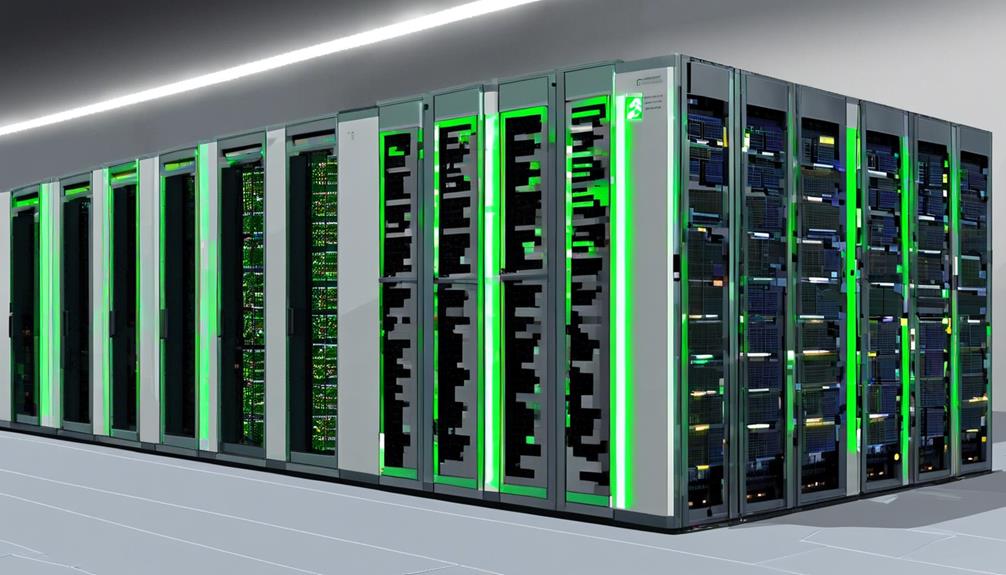
Schneider Electric Solutions offer a range of advantages for organizations seeking modular data center solutions. With the increasing demand for scalable and flexible data centers, Schneider Electric's solutions provide the necessary features to meet these requirements.
One of the key advantages of Schneider Electric solutions is their ability to provide flexibility in building and growing data centers as needed. The modular design allows for easy expansion or reconfiguration, enabling organizations to adapt to changing needs without major disruptions to operations. This flexibility also extends to the ability to deploy data centers in various locations, including remote or harsh environments.
In addition to flexibility, Schneider Electric solutions offer speed and predictability. The simplified site coordination and scheduling enable faster deployment of data centers, minimizing downtime and accelerating time-to-market. The solutions are also designed to ensure predictable outcomes in terms of density, availability, and cost. This predictability is crucial for organizations to plan their resources effectively and avoid unexpected expenses.
Schneider Electric provides quantitative Total Cost of Ownership (TCO) analysis, comparing traditional data centers to their modular and prefabricated solutions. This analysis allows organizations to make informed decisions based on the financial benefits of adopting modular data center solutions.
Flexibility in Modular Data Center Design
Flexibility in the design of modular data centers allows for tailored solutions that meet specific business needs and enable efficient resource allocation and cost savings.
The modular data center design provides the freedom to scale infrastructure up or down based on changing demands, ensuring optimal resource utilization. This flexibility is particularly valuable in today's fast-paced business environment, where companies need to quickly adapt to new technologies and market conditions.
The modular approach to data center design also allows for quick and easy expansion without disrupting ongoing operations. By deploying modular data centers anywhere, anytime, organizations can rapidly scale their IT infrastructure to support growth or address capacity constraints. This agility in expansion provides a significant advantage over traditional data center construction, which often involves lengthy planning and construction processes.
Customizable components in modular data center design further enhance flexibility. Power systems, cooling systems, and rack systems can be tailored to meet the unique requirements of diverse IT environments. This customization ensures that the modular data center solution aligns closely with the specific needs of the business, maximizing efficiency and minimizing unnecessary costs.
The plug-and-play nature of modular data centers facilitates rapid deployment, reducing construction time and operational disruption. With pre-engineered and pre-configured modules, the installation process is streamlined, minimizing the time required to get the data center up and running. This efficiency not only saves time but also reduces costs associated with construction and deployment, making modular data centers an attractive option for businesses looking to optimize their IT infrastructure.
Speed and Efficiency in Modular Data Centers
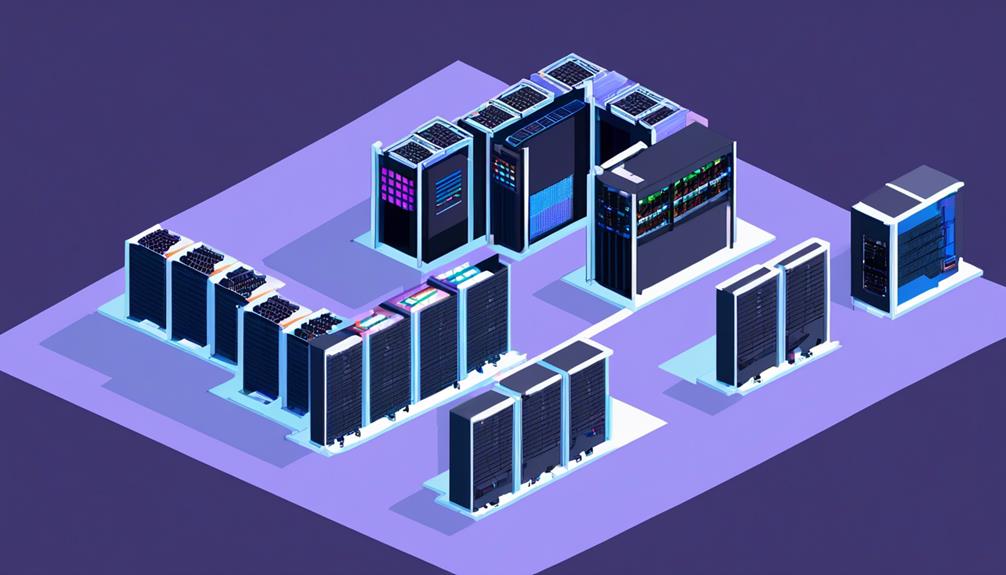
Speed and efficiency are key advantages of modular data centers. Schneider Electric's modular data centers offer rapid deployment benefits, reducing deployment times by 50% compared to traditional builds.
These energy-efficient solutions provide the flexibility to build and grow as needed, ensuring predictable density, availability, and cost for maximum speed and efficiency.
Rapid Deployment Benefits
Achieving rapid deployment and operational efficiency is a key advantage offered by modular data centers, resulting from streamlined site coordination and scheduling processes. Compared to traditional builds, modular data centers can reduce deployment times by 50%.
This speed is achieved through simplified site coordination and scheduling, ensuring predictable results in terms of density, availability, and cost. The modular design also offers flexibility and scalability, allowing for efficient and cost-effective growth as needed.
Modular data centers provide various solutions, such as prefabricated data halls, all-in-one modules, power modules, and power skids, which further enhance the deployment benefits.
Additionally, with the increasing demand for data centers in non-traditional environments driven by IoT technology, modular data centers can be operational within 6-9 months from design sign-off, further highlighting their rapid deployment capabilities.
Energy-Efficient Solutions
Modular data centers offer energy-efficient solutions, combining speed and efficiency in their implementation. Here are three key ways in which modular data centers achieve energy efficiency:
- Simplified Cooling Systems:
Modular data centers are designed with efficient cooling systems, employing technologies such as hot aisle containment and cold aisle containment. These techniques ensure that cool air is directed to the servers, minimizing energy wastage.
- Renewable Energy Integration:
Modular data centers can be easily integrated with renewable energy sources such as solar panels or wind turbines. This enables the data center to reduce its reliance on traditional power grids, resulting in lower energy consumption and reduced environmental impact.
- Optimized Power Usage:
Modular data centers are equipped with advanced power management systems that optimize energy usage. These systems monitor and adjust power consumption according to the actual server load, preventing unnecessary energy wastage.
Predictability in Modular Data Center Solutions
Predictability in modular data center solutions ensures the expected density, availability, and cost, providing a reliable and efficient environment for IT infrastructure. Modular data center solutions offer a flexible and scalable approach to building and growing data centers. This flexibility allows for easier planning and resource management, ensuring that the density, availability, and cost requirements are met.
One key aspect of predictability in modular data center solutions is modular power. By using modular power distribution units (PDUs), data centers can be designed and deployed with a high level of predictability. Modular PDUs allow for easy scalability and can be quickly added or removed as power requirements change. This modular approach to power distribution ensures that the data center can adapt to changing needs without sacrificing availability or efficiency.
In addition to modular power, simplified site coordination and scheduling contribute to achieving speed in deployment. With traditional data center construction, the process can be complex and time-consuming, leading to delays and cost overruns. However, with modular data center solutions, the components are pre-manufactured and tested, enabling faster deployment. This predictability in the construction process reduces the risks associated with traditional data center construction.
Case Studies of Successful Modular Data Center Implementations
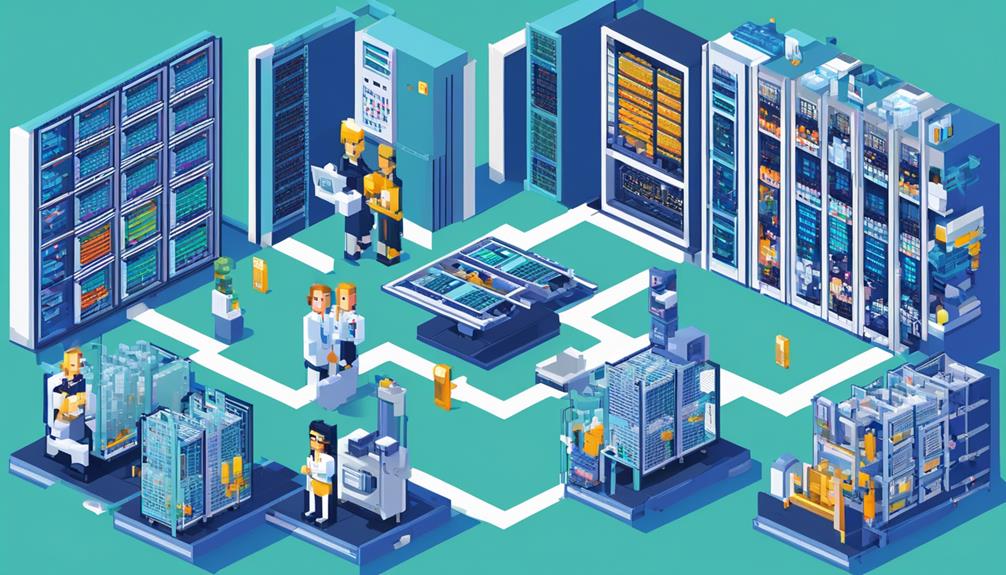
Successful case studies of modular data center implementations provide valuable insights into implementation strategies and operational efficiencies.
For example, Animal Logic utilized a modular data center to support high-density applications in their animation and visual effects projects.
Moreno Valley Unified School District improved network connectivity and technology integration in the classroom with the EcoStruxure Modular Data Center.
These real-world examples demonstrate the benefits of modular data centers in achieving efficient and effective data center operations.
Implementation Strategies
Several organizations have achieved significant success in implementing modular data centers to support high-density applications, enhance network connectivity, and improve technology integration in various industries. These successful implementations can serve as valuable case studies for organizations considering modular data center solutions for their own data center builds.
Here are three examples:
- Animation and visual effects studio Animal Logic utilized a modular data center to support high-density applications in their film production process. This allowed them to efficiently handle the demanding computational requirements of films like The LEGO Movie and The Matrix.
- Moreno Valley Unified School District leveraged an EcoStruxure Modular Data Center to enhance network connectivity, data center monitoring, and technology integration in the classroom. This allowed them to provide a robust and reliable technology infrastructure for their students and faculty.
- Schneider Electric's Modular Data Centers have been implemented in various organizations, offering advantages such as flexibility, speed, and predictability. Case studies highlight successful implementations at the world heritage site Sagrada Familia, Weizmann Institute for genome research analytics, and LightEdge's hybrid colocation data center model.
These case studies demonstrate the effectiveness of modular data center solutions in meeting the specific needs of different industries and organizations. By studying and implementing similar strategies, organizations can achieve successful modular data center implementations.
Operational Efficiency
One notable example of achieving operational efficiency through the implementation of modular data centers is the success story of Animal Logic, an animation and visual effects studio.
By deploying modular data center solutions, Animal Logic was able to improve their operational efficiency in several ways.
Firstly, the modular design allowed for faster deployment, reducing the time from design sign-off to operational readiness. This enabled Animal Logic to meet their production deadlines more effectively.
Secondly, the modular data center solution provided a flexible and scalable infrastructure, allowing for easy expansion as their computing needs grew.
Lastly, the power distribution within the modular data center was optimized for efficiency, ensuring that energy was distributed effectively and minimizing wastage.
Explore Products and Solutions for Modular Data Centers
Schneider Electric offers a comprehensive range of products and solutions for modular data centers, providing organizations with efficient and cost-effective options for their data storage needs.
Here are three key offerings from Schneider Electric for modular data center solutions:
- EcoStruxure Modular Data Centers: Schneider Electric's EcoStruxure platform provides a range of modular data centers tailored to meet specific industry needs. These modular solutions offer reduced deployment times and increased flexibility, allowing organizations to quickly scale their data storage capacity. Case studies highlight successful applications in animation studios and educational institutions, demonstrating the versatility and effectiveness of Schneider Electric's modular data centers.
- Cost Efficiency through Prefabricated Solutions: Schneider Electric's modular data centers are built using prefabricated components, resulting in significant cost savings. The prefabricated design ensures faster installation times and allows for easy customization and expansion as data storage needs evolve. This modular approach eliminates the need for traditional construction methods, reducing both capital and operational expenses.
- Support and Resources for Design: Schneider Electric provides comprehensive support and resources for modular data center design. Real-time remote monitoring capabilities enable proactive management and maintenance, ensuring optimal performance and uptime. Additionally, a range of cooling options is available to ensure efficient temperature control within the modular data center environment.
Frequently Asked Questions
What Is an Example of a Modular Data Center?
An example of a modular data center is a containerized solution that consists of pre-fabricated units with a scalable infrastructure. These modular data centers are designed to provide flexible and efficient data storage and processing capabilities.
They can be quickly deployed and offer reduced deployment times compared to traditional data centers. With their modular design, these data centers can easily accommodate future growth and expansion needs.
Who Are the Top Modular Data Center Manufacturers?
The top modular data center manufacturers in the industry are Schneider Electric, Eaton, and Vertiv Global Solutions. These companies offer a range of modular data center solutions that address the emerging trends in the industry, such as reduced deployment times and IoT-driven infrastructure needs.
However, implementing modular data center solutions can also present challenges, such as ensuring seamless integration with existing systems and addressing scalability issues. These manufacturers are at the forefront of developing innovative solutions to overcome these challenges and provide efficient and reliable modular data centers.
What Is the Difference Between Traditional and Modular Data Centers?
Traditional data centers are built on-site in a permanent location, while modular data centers are pre-fabricated and can be deployed anywhere.
The main difference lies in their construction and deployment methods. Traditional data centers require extensive construction, resulting in longer deployment times and higher costs.
On the other hand, modular data centers are pre-fabricated, offering faster deployment times, reduced construction costs, and scalability. They can be easily expanded or downsized based on the organization's needs, providing flexibility and cost-efficiency.
What Are the Advantages of Modular Data Centers?
Modular data centers offer numerous advantages that make them a preferred choice for businesses.
One key advantage is scalability, allowing organizations to easily expand their data center capacity as their needs grow.
Additionally, modular data centers provide flexibility, enabling businesses to customize and reconfigure the infrastructure to meet specific requirements.
This flexibility also contributes to cost effectiveness, as organizations can optimize their resources and only invest in what they truly need.
